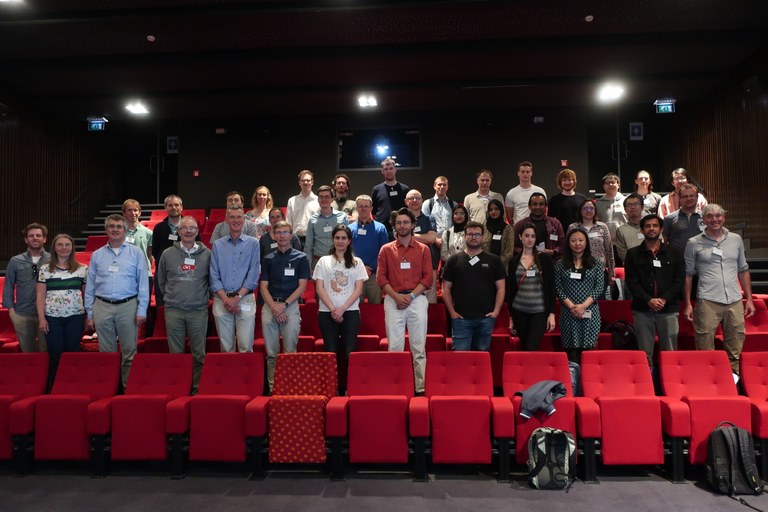2023 Spring Meeting
Participants of the 2023 Spring Meeting at TU Eindhoven
Wednesday May 31, 2023 , the Dutch-Flemish Scientific Computing Society organized its annual Spring Meeting. This year it took place at Eindhoven University of Technology. A mix of young and senior researchers were invited to present their research.
Participation including lunch was free of charge. This year we had 46 registrations.
Location:
TU Eindhoven
Filmzaal, Zwarte Doos, ( building 4 on the map) is at a 10 minute walk from the NS station Eindhoven Centraal
Organization
The spring meeting is organized yearly by the Dutch-Flemish Scientific Computing Society (SCS), this year in cooperation with Eindhoven University of Technology.
Organizing committee: Barry Koren (TU Eindhoven) and Martine Anholt (CWI, Secretary SCS).


Support for this meeting has been obtained from Centrum Wiskunde & Informatica (CWI) and TU Eindhoven.
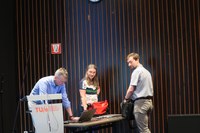
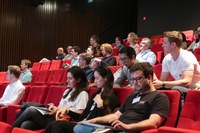
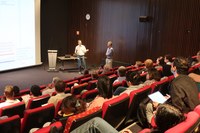





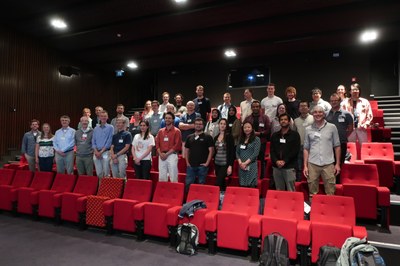 More pictures can be found here.
More pictures can be found here.
Links to the talks will be shared soon
Program 2023
|
09:00-09:30 |
Registration, coffee and tea |
|
09:30-10:10 |
Svetlana Dubinkina, VU Amsterdam |
|
10:10-10:35 |
Emil Løvbak, KU Leuven |
|
10:35-11:00 |
Pascal den Boef, TU Eindhoven |
|
11:00-11:30 |
Coffee and tea |
|
11:30-11:55 |
Philipp Horn,TU Eindhoven
|
|
11:55-12:20 |
Jonas Thies, TU Delft |
|
12:20-12:30 |
Group picture |
|
12:30-13:30 |
Lunch |
|
13:30-13:55 |
Mariya Ishteva, KU Leuven |
|
13:55-14:20 |
Fang Fang, TU Delft |
|
14:20-14:50 |
Coffee, tea and refreshments |
|
14:50-15:15 |
Anne Eggels, Sioux Technologies |
|
15:15-15:55 |
Wim Vanroose, University of Antwerp |
|
15:55-16:00 |
Closure |
Speakers Spring meeting SCS 2023
 |
Svetlana Dubinkina, VU Amsterdam |
 |
Wim Vanroose, University of Antwerp He co-founded two companies. Motulus.aero provides optimization software to the airline industry and Polygonal introduces shape optimization techniques in the textile and fashion industry.
|
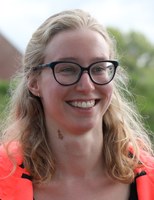 |
Anne Eggels, Sioux Technologies Anne Eggels is working at Sioux Technologies as a Mathware Designer. Her PhD project was at the Centrum Wiskunde & Informatica on uncertainty quantification with dependent input data, mainly applied to offshore wind farms. At Sioux Technologies, she works on industrial problems regarding computational physics and optimization. |
 |
Fang Fang, TU Delft Dr. Fang Fang obtained a PhD in Computational Finance from TU Delft in 2010, based on the innovation of “the COS method”. Since 2021 she has been working for TU Delft as a part-time assistant professor. She is also a senior quant consultant and a modelling expert, with 14 years hands-on experience in pricing model validation and risk model development at Tier-1 financial institutions in The Netherlands. Her research interest lies in improving numerical methods and models for 1) risk quantification and allocation, 2) derivative pricing and 3) time series predictions. Courses she teaches/moderates include Computational Finance (MSc), Advanced Credit Risk Management (MOOC course jointly prepared by TU Delft and Deloitte) and Introduction of Credit Risk Management (MOOC by TU Delft). |
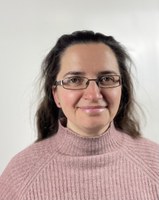 |
Mariya Ishteva, KU Leuven
|
 |
Jonas Thies, TU Delft Jonas Thies has a Bachelor degree in Computational Engineering (Erlangen 2003), a Master in Scientific Computing (KTH Stockholm, 2006) and a PhD in Applied Mathematics (Groningen 2011). He spent two years at the Center for Interdisciplinary Mathematics in Uppsala, after which he moved to Cologne as a Scientific Employee of the German Aerospace Center (DLR) for Software Technology. There he led a research group on parallel numerics from 2017 to 2021. Since June 2021 he is an Assistant Professor at the Delft High Performance Computing Center DHPC. |
 |
Pascal den Boef, TU Eindhoven Pascal den Boef is a PhD student in the COMPAS project at Eindhoven University of Technology. The focus of his studies is model reduction of nonlinear dynamic models with applications in virtual sensing and design optimization. Of special interest are thermo-mechanical models of automotive components. He received his MSc. degree in Electrical Engineering in 2019 from the same university with a thesis on system identification of LPV systems. Besides his PhD studies, he co-founded two companies: Drebble provides consultancy in the area of control engineering and Hawkeye Recognition develops computer vision solutions for edge devices. |
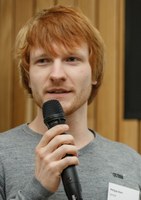 |
Philipp Horn, TU Eindhoven Philipp Horn is a PhD student in the UNRAVEL project at TU Eindhoven. The current focus of his research is formed by structure preserving neural networks for Hamiltonian systems. He obtained his B.Sc. degree in Simulation Technology from the University of Stuttgart. Followed by a double master program in Simulation Technology at the University of Stuttgart and Industrial and Applied Mathematics at TU Eindhoven. After his studies he shortly had a position as Junior Researcher at DIFFER in Eindhoven, researching structure preserving neural network surrogate models for fusion simulation |
 |
Emil Løvbak, KU Leuven Emil obtained a BSc degree in Computer Science and Electrical engineering and an MSc degree in Mathematical Engineering from KU Leuven. After four years as a PhD Fellow of the Research Foundation Flanders, he is currently a researcher in the NUMA group at KU Leuven. His research areas cover multilevel Monte Carlo methods, stochastic optimization and kinetic equations. |
Abstracts Spring Meeting SCS 2023
| Svetlana Dubinkina, VU Amsterdam |
Projected ensemble data assimilation |
| Wim Vanroose, University of Antwerp |
Krylov-Simplex, Residual Subspace QPAS and other subspace methods for Inverse Problems and constraint optimization. |
| Anne Eggels, Sioux Technologies |
Applications of mathematics to industrial problems Mathematics, and especially mathematical modelling is a very useful tool to improve the world around us. At Sioux Mathware, we combine scientific knowledge with a pragmatic focus on engineering and operations research. One clear example of this are high-tech systems which can always be improved to be faster, more accurate, more robust, and more autonomous. The complexity of these systems, together with a fast development cycle, makes computational physics a challenging topic. It creates understanding about physical processes and the behavior of individual components in a larger system. During this talk, I will show some examples of applications and give more details on a specific project. |
| Fang Fang, TU Delft |
A Novel Fourier-cosine method for risk quantification and allocation of credit portfolios Credit risk quantification and allocation in the factor-copula model framework underlies various practical applications in the banking industry. The popular numerical method in the banking industry is Monte Carlo (MC) simulation, which not only takes a considerable amount of computational time for large portfolios, but also fails to return reliable results when it comes to risk allocation at a standard high quantile like 99.9%. We present a novel Fourier-cosine method, which not only serves as a fast solver for portfolio-level risk quantification, but also fills the niche in literature of an accurate numerical method for risk allocation. The key insight is that, compared to directly estimating the portfolio loss distribution, it can be much more efficient to solve the characteristic function (ch.f.) instead, after which the ch.f. can be inverted to recover the cumulative distribution function (CDF) semi-analytically via the popular Fourier-cosine (COS) method in the field of option pricing but with some extension. We therefore name this method the COS method. As for allocation of risk measures, we show that, via the Bayes law, the original problem can be transformed to the evaluation of a conditional CDF, which can again be solved following the same insight. Theoretical proof of the error convergence is also provided, which effectively justifies the stability and accuracy of this method in recovering CDFs of discrete random variables in general. For real-sized portfolios, the calculation speed and accuracy are tested to be significantly superior to Monte Carlo simulation in the two-factor set-up. A Gaussian copula and a Gaussian-t hybrid copula are taken as examples to illustrate the flexibility of this method regarding copula choices; Value-at-Risk, Expected Shortfall (ES) and Euler allocation of ES are risk metrics selected for testing. The potential application scope is wide: Economic Capital for Banking Book, Default Risk Charge for Trading Book, valuation of credit derivatives, etc. |
| Mariya Ishteva, KU Leuven |
Decoupling multivariate functions using tensors While linear functions are well-understood, defining and reducing the complexity, and increasing the interpretability of nonlinear multivariate vector functions remains challenging. We propose a decomposition of nonlinear functions [1], which can be viewed as a generalization of the singular value decomposition. In this decomposition, univariate nonlinear mappings replace the simpler scaling performed by the singular values. We discuss the computation of the decomposition, which is based on tensor techniques. We also mention applications in nonlinear system identification. Recent extensions of this decomposition allow for its wider applicability, e.g., for neural network compression. [1] P. Dreesen, M. Ishteva, and J. Schoukens. Decoupling multivariate polynomials using first-order information and tensor decompositions. SIMAX, 36:864--879, 2015. |
| Jonas Thies, TU Delft |
Scaling the Memory Wall for Sparse Iterative Solvers
Krylov subspace methods for solving sparse linear and eigenvalue problems are nowadays at the core of many simulations across disciplines. On High Performnace Computers at any scale,
the fact that their core operations (sparse matrix-vector and BLAS1 operations) need to be executed
in sequence for optimal numerical behavior is a limiting factor.
We discuss how sparse matrix polynomials can be evaluated in a cache-efficient way on multi-core CPUs. We then demonstratehow the availability of such fast polynomial evaluations may influence the design and choice of iterative solvers and preconditionersin practical applications.
|
| Pascal den Boef, TU Eindhoven |
Stochastic Gradient Descent for Optimization of Large-Scale Dynamic Systems |
|
Philipp Horn,
TU Eindhoven |
Structure-Preserving Neural Networks for Hamiltonian Systems |
| Emil Løvbak, KU Leuven |
Adjoint Monte Carlo particle methods with reversible random number generators |

